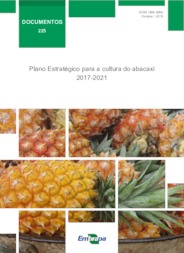 Busca de Projetos
Busca de Projetos
Transference and Diffusion of Pineapple Integrated Production in the State of Pará
Pineapple is explored in Brazil in approximately 60,000 hectares, with the predominance of smallholdings, in which more than 80% of the properties have less than 10 hectares. The pineapple is the fifth largest produced fruit in the country, having thus great social importance in generating rural jobs and income, having the Northern and Northeastern regions as the most important ones. This project's main goal is to introduce, in the state of Pará, the system of Integrated Production Management (MPI) in the cultivation of pineapple, associated with a method of modern quality management in the food industry, being called Analysis of Danger and Critical Points of Control (APPCC), in conformity with what has been recently adopted around the world. The MPI is the guarantee that food production is safe for consumers' health, and is associated with the competitiveness of rural businesses, by means of improving productive processes, reducing producing costs and improving products' quality and safety. The PI pineapple project (PI-A) proposes to support the state's agricultural producers so that they can obtain production standards that are ecologically sustainable, following procedures established by specific norms which refer to Environmental Management and quality certification. It is estimated that the pineapple cultivation has been done at the cost of the degradation of natural resources, soil and native flora. The production is hindered by phytosanitary problems and deficiency in farming practices, causing thus a reduction in competitiveness, especially in exports. The method will be the following: a) creation of a Voluntary Managerial Committee (CGV/PI-A), which will work in partnership with co-executing collaborative institutions; b) CGV/PI-A coordination; b.1) Implementation of Specific Technical Norms, Grid of Agro-chemicals and Field and Post-harvest Notebooks, which are in conformity with the IN-MAPA/20; b.2) in the establishment of technical guidelines and norms, in accordance with international guidelines which deal with production quality; b.3) in the installation of the post-sale and environmental management service, within the scope of each Production Unit, and in the emission of quality seals; c) evaluation of environmental quality of the pineapple agri-business; d) the carrying out of comparative studies in loco, among the systems of PI and production in use (conventional), involving economic analysis, and multi-varied statistics and environmental quality, in five different production fields of 1 ha each. The environmental impacts on natural resources consequential to both systems will be observed; e) creation of an alert system for the producers that aim to transfer technologies of easy access, referring to the following themes: 1- plague alert (plagues and diseases); 2- emission of a daily hydric balance; 3- technical information database on prevention and control of pesticide use; 4- instructions for the use of field and post-harvest notebooks and of electronic data capture systems.; 5- courses and field days dedicated to PI-A techniques. During the first year, a managerial committee will be created, and also the instauration of the areas under the SI productions system regime and a comparative procedure for both systems; and the training of agricultural producers and technicians in MPI; the adoption of field and post-harvest notebooks; and growth monitoring; and the development and plant sanity. In the following years, in addition to these activities, an evaluation of the production and critical analysis will be done, focusing on proposing possible norm adaptations, in the hopes of tending to agro-environmental conditions in the state of Pará. The collection of information regarding forms of diagnosis, which constitutes one of the first steps of the PIF implantation, has already been done in the state of Pará by the team which composes this project.
/n
/n
Ecosystem: Amazonic
Status: Completed Start date: Sat Aug 01 00:00:00 GMT-03:00 2009 Conclusion date: Tue Jul 31 00:00:00 GMT-03:00 2012
Head Unit: Embrapa Eastern Amazon
Project leader: Aloyseia Cristina da Silva Noronha
Contact: aloyseia.noronha@embrapa.br
